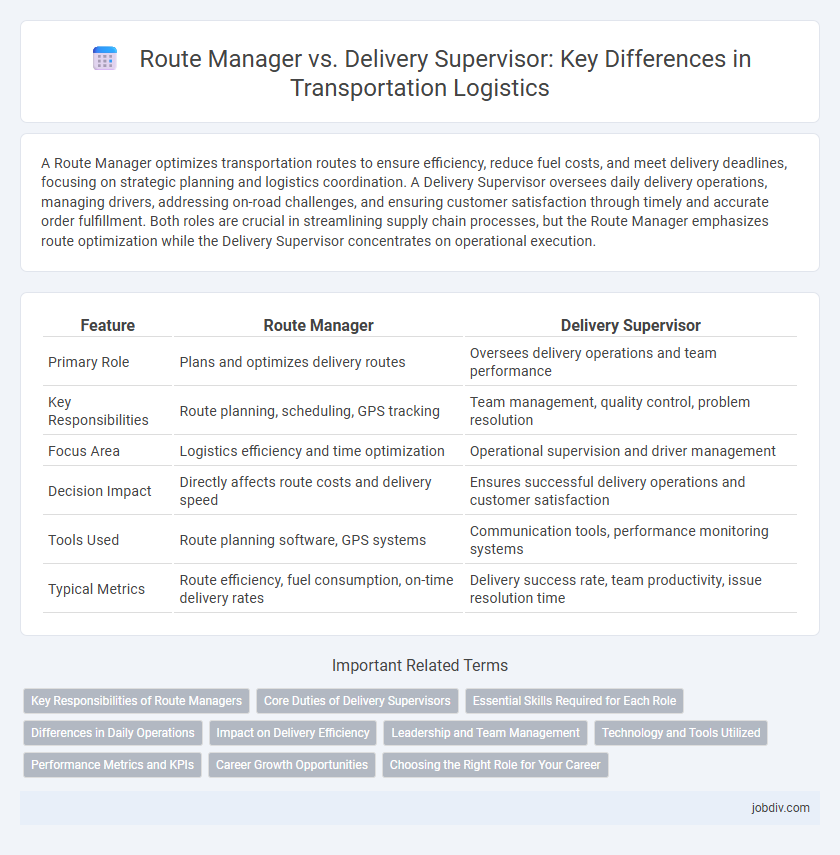A Route Manager optimizes transportation routes to ensure efficiency, reduce fuel costs, and meet delivery deadlines, focusing on strategic planning and logistics coordination. A Delivery Supervisor oversees daily delivery operations, managing drivers, addressing on-road challenges, and ensuring customer satisfaction through timely and accurate order fulfillment. Both roles are crucial in streamlining supply chain processes, but the Route Manager emphasizes route optimization while the Delivery Supervisor concentrates on operational execution.
Table of Comparison
| Feature | Route Manager | Delivery Supervisor |
|---|---|---|
| Primary Role | Plans and optimizes delivery routes | Oversees delivery operations and team performance |
| Key Responsibilities | Route planning, scheduling, GPS tracking | Team management, quality control, problem resolution |
| Focus Area | Logistics efficiency and time optimization | Operational supervision and driver management |
| Decision Impact | Directly affects route costs and delivery speed | Ensures successful delivery operations and customer satisfaction |
| Tools Used | Route planning software, GPS systems | Communication tools, performance monitoring systems |
| Typical Metrics | Route efficiency, fuel consumption, on-time delivery rates | Delivery success rate, team productivity, issue resolution time |
Key Responsibilities of Route Managers
Route Managers oversee the planning, optimization, and execution of transportation routes to ensure timely deliveries and cost efficiency. They analyze route performance data, coordinate with drivers, and implement strategies to improve fuel efficiency and reduce transit times. Their role includes monitoring compliance with safety regulations and managing schedules to enhance overall supply chain productivity.
Core Duties of Delivery Supervisors
Delivery Supervisors oversee the entire delivery process, ensuring timely dispatch, route adherence, and customer satisfaction. Their core duties include managing driver performance, coordinating with warehouse teams to prepare shipments, and resolving delivery issues to maintain operational efficiency. Unlike Route Managers who plan and optimize routes, Delivery Supervisors focus on execution and real-time problem-solving during the delivery phase.
Essential Skills Required for Each Role
Route Managers must excel in strategic planning, data analysis, and GPS technology to optimize delivery routes and reduce transit times. Delivery Supervisors require strong leadership, communication skills, and real-time problem-solving abilities to manage teams and ensure timely deliveries. Both roles demand proficiency in logistics software and a deep understanding of supply chain operations to enhance overall transportation efficiency.
Differences in Daily Operations
Route Managers coordinate overall route planning and optimization, ensuring efficient delivery schedules and fuel management across multiple routes. Delivery Supervisors focus on overseeing drivers' performance, managing timelines, handling customer communications, and resolving on-the-ground delivery issues. While Route Managers analyze data for strategic routing, Delivery Supervisors manage daily operational execution and team accountability.
Impact on Delivery Efficiency
Route Managers optimize delivery routes using advanced software, reducing travel time and fuel consumption to enhance overall efficiency. Delivery Supervisors ensure on-ground adherence to schedules, resolve real-time issues, and maintain driver performance standards. Effective collaboration between both roles significantly boosts delivery speed and customer satisfaction.
Leadership and Team Management
Route Managers excel in strategic planning and route optimization, leading teams to enhance efficiency and reduce operational costs. Delivery Supervisors focus on direct team management, ensuring timely deliveries and addressing on-the-ground challenges with hands-on leadership. Both roles require strong communication skills, but Route Managers prioritize long-term logistics coordination while Delivery Supervisors concentrate on daily team performance and problem-solving.
Technology and Tools Utilized
A Route Manager leverages advanced route optimization software and GPS tracking systems to streamline delivery schedules and reduce operational costs. In contrast, a Delivery Supervisor employs real-time communication tools and delivery management platforms to monitor driver performance and ensure timely shipments. Both roles utilize technology such as mobile apps and data analytics but differ in focus, with Route Managers emphasizing strategic planning and Delivery Supervisors concentrating on execution and team coordination.
Performance Metrics and KPIs
Route Managers optimize delivery efficiency by tracking on-time delivery rates, route adherence, and fuel consumption metrics, directly impacting cost reduction and customer satisfaction. Delivery Supervisors focus on team productivity KPIs such as driver compliance, load accuracy, and incident response times to ensure operational safety and accuracy. Both roles rely on performance dashboards that integrate GPS data, delivery punctuality, and resource utilization to enhance overall transportation logistics.
Career Growth Opportunities
Route Managers typically have broader responsibilities, overseeing multiple delivery routes and optimizing logistics, which positions them for advancement into senior logistics or operations management roles. Delivery Supervisors focus on managing day-to-day delivery teams and on-the-ground problem-solving, offering strong leadership experience but with narrower operational scope. Career growth for Route Managers often includes progression into regional management or supply chain director roles, while Delivery Supervisors may advance into higher-level supervisory or dispatch coordination positions.
Choosing the Right Role for Your Career
Route Manager oversees the planning and optimization of delivery routes to enhance efficiency and reduce costs, requiring strong analytical skills and knowledge of logistics technology. Delivery Supervisor focuses on managing delivery teams, ensuring timely deliveries, and maintaining high customer service standards, demanding leadership and communication abilities. Choosing the right role depends on whether you prefer strategic route planning or direct team management within the transportation industry.
Route Manager vs Delivery Supervisor Infographic

 jobdiv.com
jobdiv.com